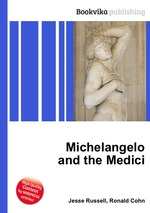Michelangelo and the Medici
Jesse Russell Ronald Cohn
бумажная книга
High Quality Content by WIKIPEDIA articles! Michelangelo`s father sent him to study grammar with the Humanist Francesco da Urbino in Florence as a young boy. The young artist, however, showed no interest in his schooling, preferring to copy paintings from churches and seek the company of painters. At thirteen, Michelangelo was apprenticed to the painter Domenico Ghirlandaio. When Michelangelo was only fourteen, his father persuaded Ghirlandaio to pay his apprentice as an artist, which was highly unusual at the time. When in 1489 Lorenzo de` Medici, de facto ruler of Florence, asked Ghirlandaio for his two best pupils, Ghirlandaio sent Michelangelo and Francesco Granacci. Lorenzo had taken notice of Michelangelo’s unusual talent and, wishing to encourage him, proposed for Michelangelo to move into the palace and live there as his son to be educated along with the Medici children. Lorenzo even offered Michelangelo’s father Lodovico a respectable position in the palace. Michelangelo was thrown into the midst of the Medici circle where he was involved with poetry, science, philosophy, and art. It was then that Michelangelo first began writing down his deepest thoughts in poetry which he continued to do for the rest of his life. From 1490 to 1492, Michelangelo attended the Humanist academy which the Medici had founded along Neo Platonic lines. He absorbed Platonist and Neo-Platonist philosophies through his direct contact with some of the great Humanist philosophers of the Medici Court. Consequently, both Michelangelo`s outlook and his art were subject to the influence of many of the most prominent philosophers and writers of the day including Marsilio Ficino, Pico della Mirandola and Angelo Poliziano. Michelangelo studied sculpture under Bertoldo di Giovanni. At this time Michelangelo sculpted the reliefs Madonna of the Steps (1490–1492) and Battle of the Centaurs (1491–1492). The latter was based on a theme suggested by Poliziano and was commissioned by Lorenzo de` Medici.


